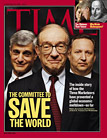I am very pleased with the president’s nomination of Janet Yellen to be the next Federal Reserve Chair. Ms. Yellen has impeccable credentials, the best economic forecasting record of any recent Fed official, and appears to take the regulator part of the Fed Chair job seriously.
This last part is important. Larry Summers, the original front-runner for the job, helped push through the key deregulation of the late Clinton years, has dismissed the idea that it contributed to the bubble or crash, and has basically never admitted a mistake in this area. Alan Greenspan was essentially hostile to financial regulation, and bears as much responsibility as anyone for the housing bubble of the 2000s. Ben Bernanke has acknowledged that the Fed failed as a regulator during the housing bubble, but he was a Fed governor for most of that bubble and Chair for the last two years of it. Economist Bill Black finds Bernanke to have been sorely lacking as a regulator. The Fed’s main regulatory task is to try to detect and reduce systemic risk, i.e., risky activities that threaten the larger financial system and economy. Granted, Yellen told the Financial Crisis Inquiry Commission in 2010 that she failed to see several of those risks (securitization, credit rating agencies, Special Investment Vehicles) when she was San Francisco Fed President in 2004-2010, but on the other hand she was among the first at the Fed to publicly call attention to the housing bubble
Granted, monetary policy, not financial regulation, is the main part of the job. I agree with those who have said she will probably be very similar to Bernanke as far as that goes, and I’d call that a good thing. The Fed needs to do what it can to pull us out of this Little Depression, and since interest rates cannot fall below zero, additional measures like buying long-term bonds and mortgage-backed securities (i.e., quantitative easing, or QE) make sense, as long as they work. Yellen is often stereotyped as a “dove” because in recent years she favored expansionary policy and did not state that inflation was an imminent risk, but those recent years were the Little Depression that began in 2008. When unemployment is not the nation’s biggest problem, Yellen is more concerned about inflation. Such as in the roaring 1990s, when Yellen was Clinton’s Chair of the Council of Economic Advisers and then a Fed governor. With unemployment down to its lowest levels in decades, Yellen was an inflation “hawk,” as Matthew O’Brien details.
Whether the Senate is capable of that much nuance as it considers her nomination remains to be seen. I expect she’ll win majority support, including a handful of Republicans, and that Republicans will resist the temptation to filibuster her nomination. The right-leaning American Enterprise Institute offers several reasons why an anti-Yellen filibuster would be a disaster. Then again, flirting with disaster seems to be the Congressional Republicans’ game plan of late.
PS Here is a recent (Nov 2012) interview with Janet Yellen.
* Title stolen from EconoMonitor, who of course got it from Rocky Horror:

